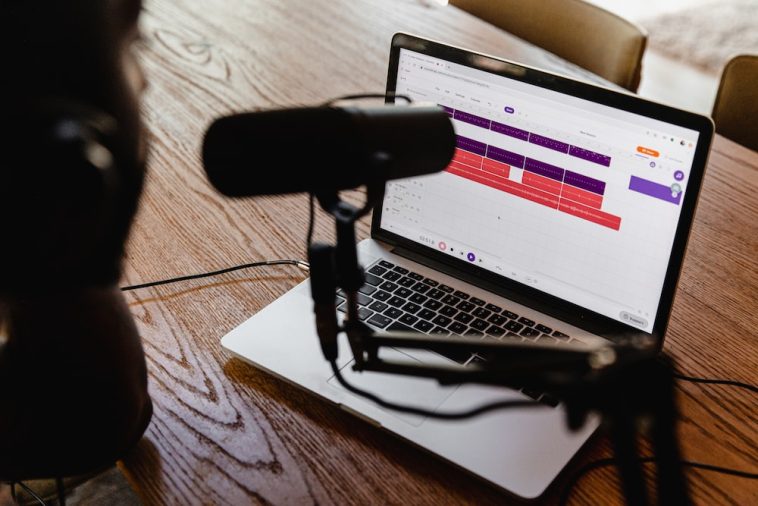Introduction.
Starting a podcast can be an exciting project. You’ve got ideas, enthusiasm, and maybe even a co-host lined up.
But then reality sets in: creating a podcast costs money. From microphones to editing software, and marketing to hosting fees, these costs can add up quickly.
I’ll break down different ways to finance a podcast, from the basics of setting a budget to leveraging outside funding options.
Financing a Podcast: The Basics
When it comes to financing a podcast, think of it in terms of “startup” and “ongoing” costs. Here’s a quick look at some typical expenses:
- Equipment: A decent microphone, headphones, pop filters, and a recording setup could range from $100 to over $1,000.
- Editing Software: Audacity (free) and GarageBand (also free for Mac users) are popular options. Premium tools like Adobe Audition cost about $20/month.
- Hosting Fees: Hosting platforms like Buzzsprout, Libsyn, or Podbean typically charge between $5 to $20 per month.
- Marketing and Branding: You’ll need graphics, perhaps a website, and social media ads. This could cost anywhere from $50 to hundreds each month.
- Guest Fees (if applicable): Some podcasts compensate guests, although this is more common once a podcast is well-established.
With these costs in mind, let’s look at ways to get your podcast off the ground financially.
1. Bootstrapping Your Podcast.
The most straightforward way to finance your podcast is by covering the costs yourself. This approach is common for beginners or hobbyists who are testing the waters. Here’s how I’d suggest doing it:
- Start Small: Pick up a budget-friendly microphone (like the ATR2100) and learn how to edit your episodes using free software.
- Prioritize Essential Costs: Focus on basics like hosting fees and your microphone. Branding and advanced editing software can come later.
- Reuse Existing Tech: Many people start recording on smartphones and basic headphones. Upgrades can come after you gain experience.
While bootstrapping requires more personal financial input, it can be a great way to test if podcasting is something you want to stick with.
2. Crowdfunding.
Crowdfunding platforms like Patreon, Kickstarter, and GoFundMe can be excellent options to finance a podcast if you already have a small audience or community support. Crowdfunding allows you to gain financial support from people who believe in your concept.
- Patreon: Offer subscribers exclusive content in exchange for monthly payments. It’s popular among podcasters who can provide extra episodes, live Q&A sessions, or behind-the-scenes content.
- Kickstarter/GoFundMe: Use these for one-time funding to cover initial equipment and setup costs. However, campaigns need strong marketing, as only a small percentage reach their goals.
Crowdfunding can be time-consuming since you need to market the campaign actively, but it’s a low-risk way to raise funds without giving up creative control.
3. Sponsorships and Ads
Sponsorships and ads are a popular way to fund podcasts, but they usually work best once you’ve built a steady audience.
- Dynamic Ad Insertion: Many hosting services offer dynamic ad insertion, where ads are placed automatically in your episodes. This is easy to set up, but rates are often low without a large listener base.
- Sponsorships: For podcasts with 1,000+ listeners per episode, reaching out to sponsors directly can yield better results. Rates vary, but according to AdvertiseCast, podcast sponsorships average $18 CPM (cost per 1,000 listeners) for a 30-second ad.
- Affiliate Marketing: Partner with brands and promote products through affiliate links. You earn a commission when listeners make purchases.
Though sponsorships and ads can bring in income, they work best if your podcast already has an audience. Until then, smaller affiliates or listener donations may be more effective.
4. Grants and Scholarships
Podcasting grants have become more available as the medium grows. Organizations like the Google Podcasts creator program and PRX offer grants and resources for podcasters, often geared towards underrepresented voices.
- Google Podcasts Creator Program: Provides training, strategy, and funding.
- PRX: PRX offers project-specific grants focused on storytelling and social issues.
Grants can cover production costs without the expectation of repayment, but they often have competitive application processes and specific criteria.
5. Revenue from Merchandise
If you already have a following, merchandise can be a creative way to generate podcast income. Think branded T-shirts, mugs, stickers, or custom-designed merchandise.
- Print-On-Demand Services: Websites like Teespring or Printful let you sell products without holding inventory.
- Merchandise Discounts for Patrons: If you’re using Patreon, consider offering exclusive discounts on merchandise to your patrons.
Merchandising requires an upfront time investment to design and market products, but it can offer a steady income if your podcast resonates with listeners.
6. Personal Loans and Credit.
For podcasters who want to jump in full-throttle, personal loans or credit cards could be an option. This is a more high-risk method, and I’d suggest caution here since taking on debt can add financial stress.
- Personal Loans: These offer low-interest rates compared to credit cards but are still a financial commitment.
- Business Credit Cards: Some business credit cards come with an interest-free introductory period, which could be useful if you have a repayment plan in place.
Loans and credit are worth considering only if you have a clear revenue model or are confident your podcast will yield a return on investment.
Pros and Cons of Different Podcast Financing Options
| Financing Option | Pros | Cons |
|---|---|---|
| Bootstrapping | Full control, low risk | Personal financial strain, may limit podcast growth |
| Crowdfunding | Audience-supported, builds community | Time-consuming to manage, not guaranteed |
| Sponsorships and Ads | Consistent income potential, scalable | Requires large audience, may limit creative control |
| Grants | Non-repayable funding, resources available | Competitive applications, eligibility criteria |
| Merchandise | Potential for passive income, strengthens brand | Requires initial design and marketing effort |
| Loans and Credit | Quick access to funds, potential for large investments | High-risk, financial debt can cause stress |
FAQ
Q: Do I need a large budget to start a podcast?
A: Not necessarily. While a bigger budget allows for more professional equipment and editing, many successful podcasters started with basic setups and grew as their audience did.
Q: What’s the best time to look for sponsors?
A: Most podcasters suggest waiting until you have a steady audience—generally, around 1,000 listeners per episode is a good benchmark.
Q: Can I make money with my podcast in the first year?
A: It’s possible, but rare. Monetization usually takes time and a committed audience, although crowdfunding or early affiliate marketing could bring in some initial income.
Q: How do grants work for podcasts?
A: Many grants are project-based, focusing on specific themes, storytelling formats, or diverse perspectives. Applications can be competitive, so ensure your podcast aligns with the grant criteria.
Conclusion
Financing a podcast doesn’t have to be overwhelming. With options ranging from simple bootstrapping to crowdfunding and sponsorships, it’s about finding what fits your podcast’s goals, audience, and resources.
There’s no one-size-fits-all, and it’s often a mix of funding methods that lead to success. So, have you thought about what financing route you’d take to bring your podcast idea to life?





GIPHY App Key not set. Please check settings